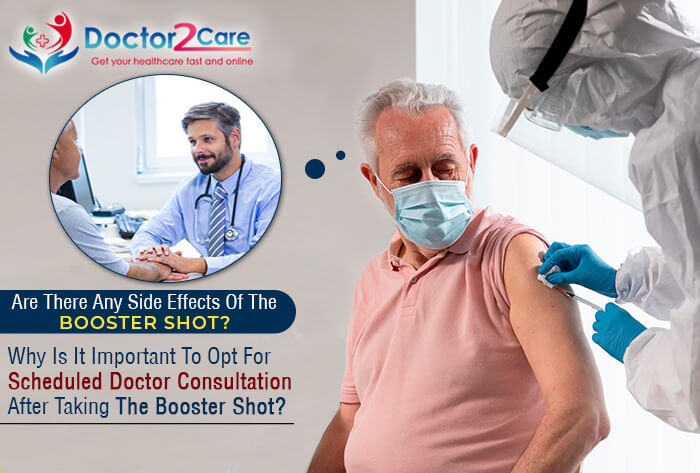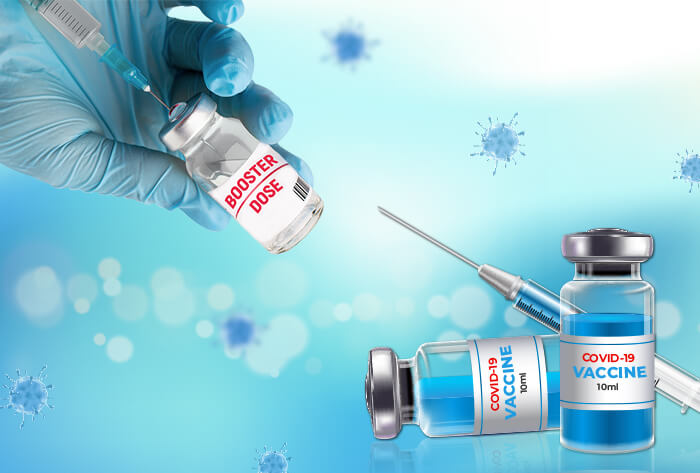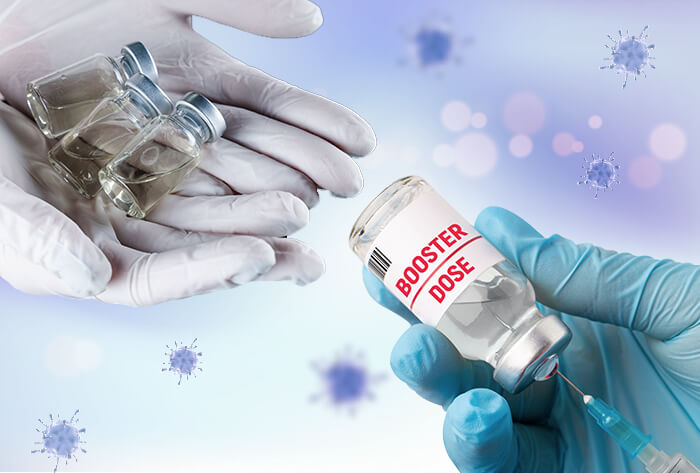Are There Any Side Effects Of The Booster Shot? Opt For Scheduled Doctor Consultation to know

Covid vaccinations have been shown to protect individuals against severe symptoms and death. Moreover, they are also known to have certain side effects, most of which are low to moderate.
COVID-19 vaccination in the prevention of COVID-19 infection. Some people have vaccination side effects, which are natural indicators that their bodies are developing protective mechanisms. These side effects may limit their ability to do everyday tasks, but they should subside after a few days. There are no negative effects for some persons, and allergic responses are uncommon. To be aware it is important to opt for the best online doctor consultation.
In response to the increased number of instances of Covid-19, India began giving booster injections to frontline employees and older residents with co-morbidities on January 10 2022.
As a highly transmissible Omicron variety leads to a massive increase in the number of infections globally, the Chinese city of Shenzhen has initiated a lockdown of a kind never seen before.
Experts believe there are no more negative effects from the booster dosage than there are with the standard Covid vaccination.
To reduce these side effects, you must take good care of your health by eating a well-balanced diet, staying hydrated, and getting enough sleep. People who have had a booster injection should avoid drinking alcohol, smoking, and eating junk food.
According to experts, the adverse effects of booster doses are often less severe than the first and second doses, and there is no need to be concerned.
When To Take A Booster Shot?
3-month After the Final Vaccination
Because of the Omicron variant, it's critical that everyone gets the best protection available as soon as feasible. As a result, the time between the last vaccination and the booster has been cut in half, from six to three months. This time frame also applies to persons who contracted coronavirus after being vaccinated.
3-month After Testing Positive With Coronavirus
If you tested positive for coronavirus after getting vaccinated, you must wait at least 3 months before having a booster vaccination.
Wait two weeks before obtaining a COVID-19 booster shot for flu or any other pneumococcal illness. After getting vaccinated against flu and/or pneumococcal illness, you can have a booster vaccination two weeks later.
An mRNA vaccine is used for booster vaccination.
Even if they previously had a different vaccine, everyone who is eligible for a booster vaccination is offered an mRNA vaccine (either BioNTech/Pfizer or Moderna).
Difference Between A Third Dose And A Booster
As part of their main vaccinated series, patients with the severe immunological disease have been administered the third dosage. Some persons in this category will be sufficiently protected against COVID-19-related severe illness or death after three doses, while others will not. Individual patients' reactions are difficult to anticipate.

Suggestions for Relieving Side Effects
If you suffer pain or discomfort after getting vaccinated, talk to your doctor about using over-the-counter pain relievers such as ibuprofen, acetaminophen, aspirin (only for persons 18 years or older), or antihistamines. You can also opt for online consultation with doctors in case it becomes difficult for you to escort the elderly to the doctor’s chamber.
If no other medical conditions prevent them from taking these drugs ordinarily, people can take them to ease adverse effects following vaccination. Inquire with your kid's healthcare professional about using non-aspirin pain medication and other measures you may take at home to help your child feel better following vaccination.
After a Booster Shot or a Second Shot
The side effects from the second dose may be more severe than those from the first shot. This is why you should opt for the best online doctor consultation before taking the shot.
These side effects are common indicators that the body is preparing to defend itself, and they should subside within a few days.
So far, responses to booster injections have been comparable to those observed following two-dose or single-dose initial doses. The most common adverse effects were fever, headache, weariness, and soreness at the injection site, with the majority of side effects being mild to severe. Serious adverse effects, like with the two-dose or single-dose main injections, are uncommon but can occur.

Scheduled consultation with doctors For Post Vaccination Elderly Care
Side effects may impair your or your child's ability to do daily tasks, but they should subside after a few days. This is why one should opt for professional elderly care in Kolkata to help the aged deal with the scenario.
- In most circumstances, pain or fever is a typical indicator that the body is preparing to defend itself. Make an appointment with a doctor or a healthcare provider:
- If the redness or pain where the injection was given grows worse after 24 hours, or if the side effects are bothersome and do not appear to be going away after a few days, opt for the best online doctor consultation.
Final thoughts…
The reaction to the COVID-19 vaccination varies from person to person. The majority of patients in clinical trials had just minor adverse effects, and others had none at all. The vaccination elicited a robust immunological response in those individuals. Whether or whether you have adverse effects after vaccination, vaccination protects you from severe COVID-19 infection.